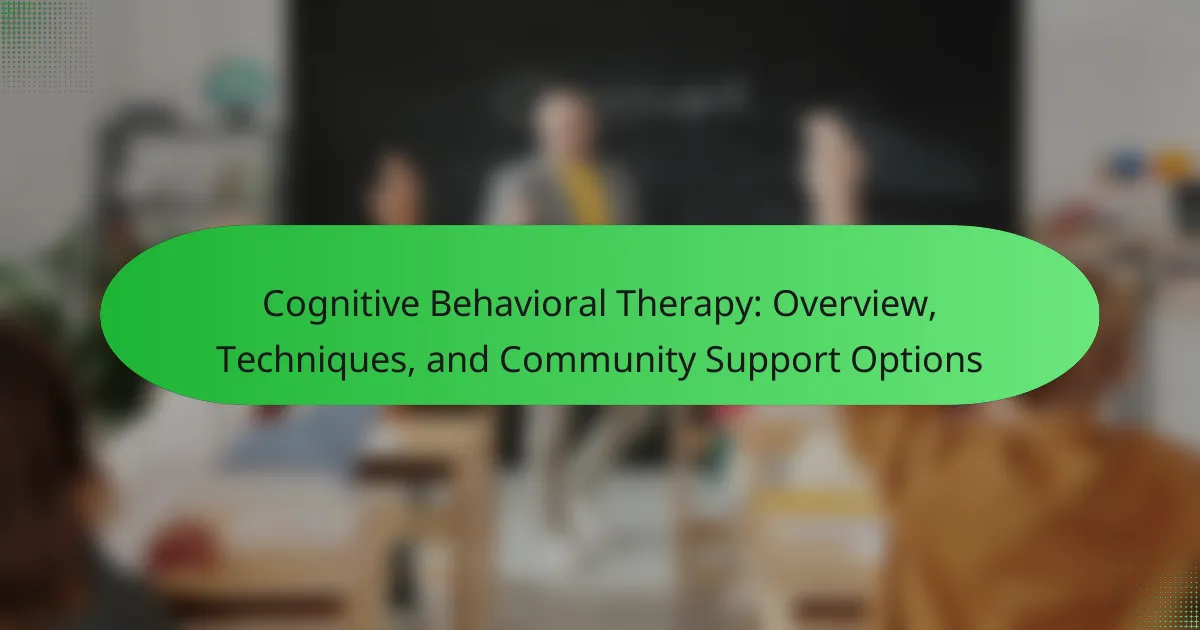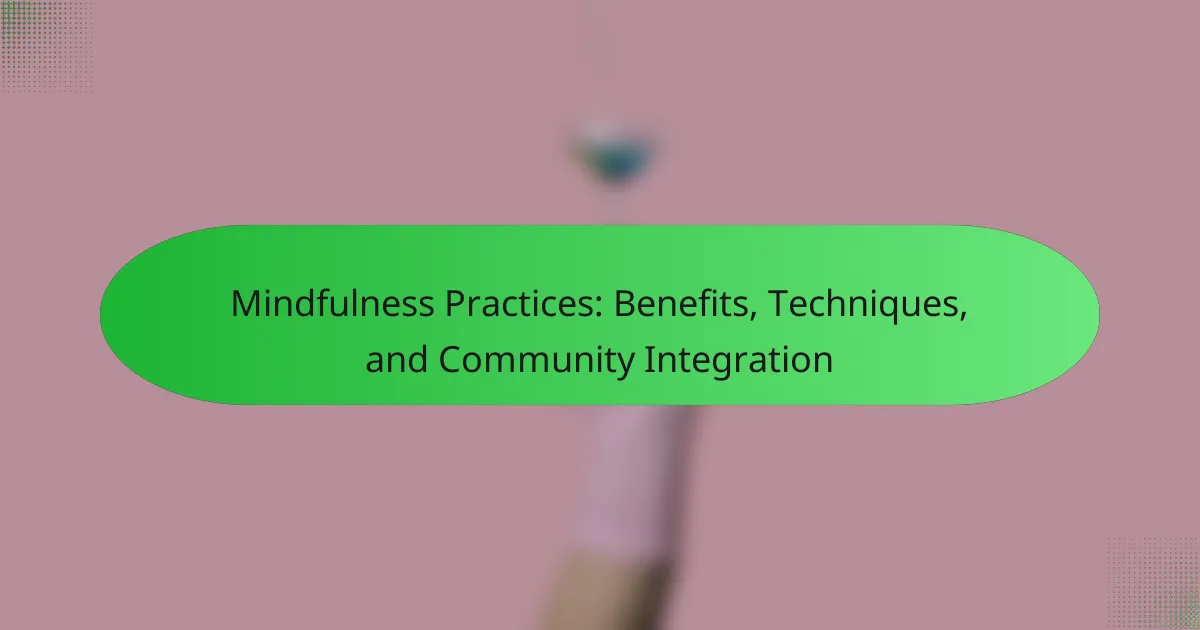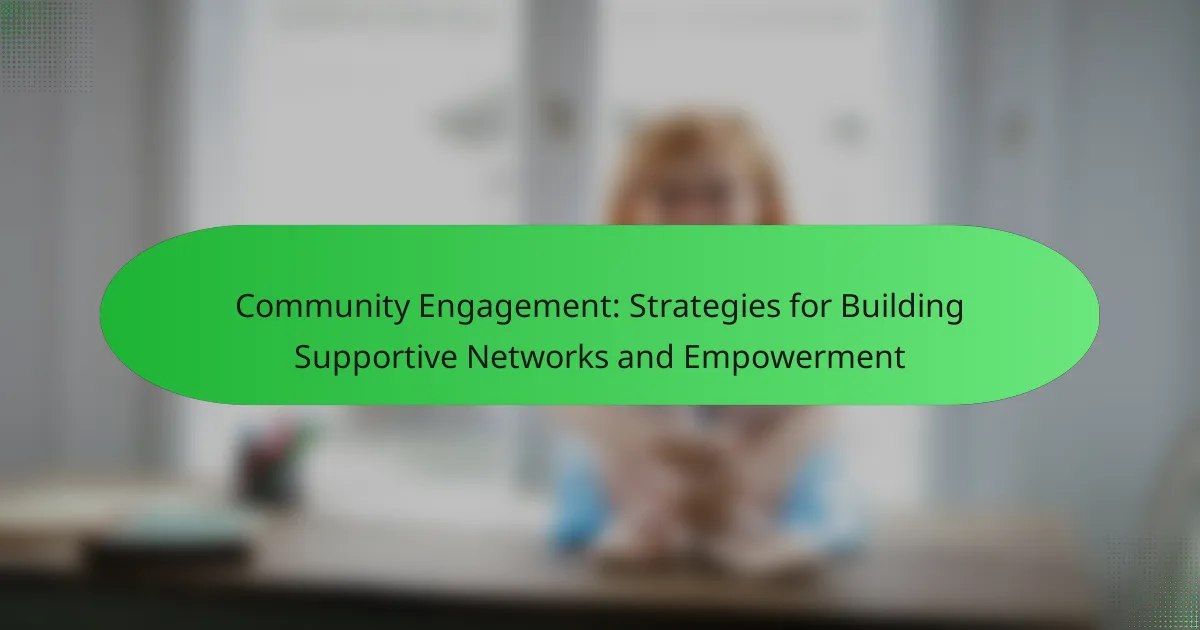Psychological self-help techniques empower individuals to enhance their mental well-being and resilience. This article explores cognitive-behavioral strategies, mindfulness practices, and self-compassion exercises. It discusses their benefits, practical applications, and cultural influences on adoption. Additionally, it addresses common challenges faced when implementing these techniques.
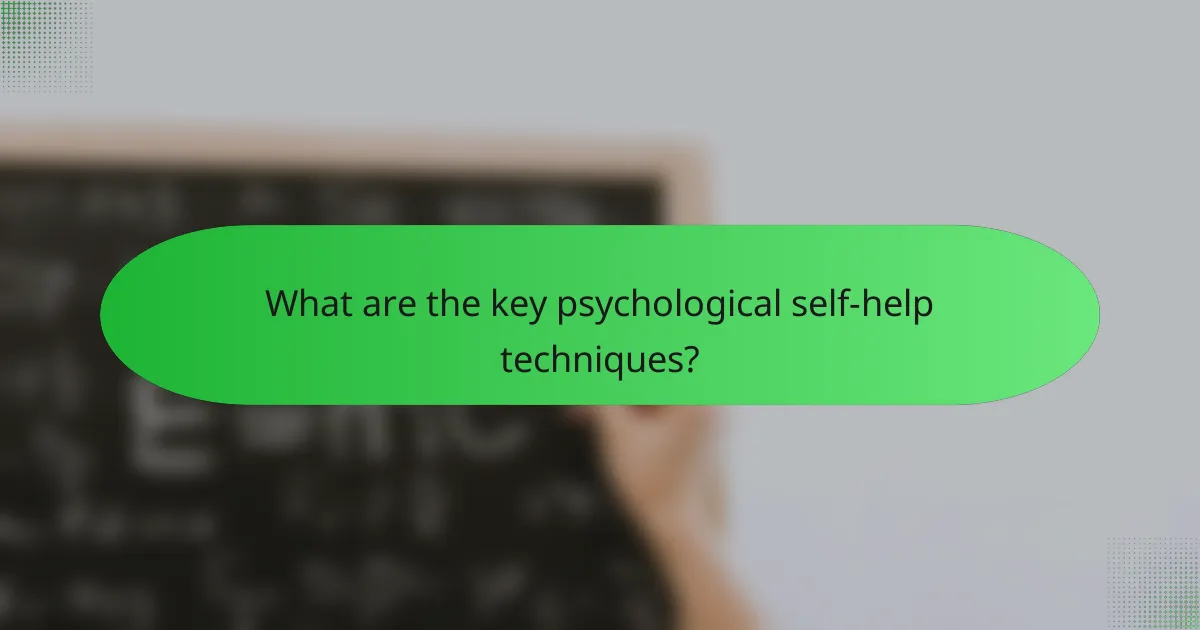
What are the key psychological self-help techniques?
Psychological self-help techniques include cognitive-behavioral strategies, mindfulness practices, and self-compassion exercises. These approaches enhance emotional resilience, improve mental clarity, and promote overall well-being.
Cognitive-behavioral techniques focus on identifying and changing negative thought patterns. Mindfulness practices encourage present-moment awareness, reducing anxiety. Self-compassion exercises foster a kinder relationship with oneself, enhancing emotional stability.
These techniques can be applied in daily life through journaling, meditation, and positive affirmations. Regular practice leads to improved mental health outcomes and greater life satisfaction.
How do cognitive-behavioral strategies enhance self-help outcomes?
Cognitive-behavioral strategies significantly enhance self-help outcomes by promoting effective coping mechanisms and fostering positive behavioral changes. These strategies help individuals identify and modify negative thought patterns, leading to improved emotional regulation and resilience.
Research shows that cognitive-behavioral techniques can increase self-efficacy, enabling individuals to tackle challenges with greater confidence. For instance, techniques such as cognitive restructuring and problem-solving skills empower users to approach situations more constructively.
Additionally, the structured nature of these strategies provides a clear framework for self-improvement. This clarity can lead to sustained motivation and commitment to personal growth. As a result, individuals often experience lasting benefits in their mental well-being and overall quality of life.
What role does mindfulness play in self-help practices?
Mindfulness significantly enhances self-help practices by promoting awareness and acceptance of thoughts and emotions. It fosters emotional regulation and reduces stress, leading to improved mental well-being. Mindfulness techniques, such as meditation and breathing exercises, encourage individuals to stay present, which can enhance the effectiveness of various psychological self-help strategies. As a result, practitioners often experience greater clarity and focus, enabling them to implement self-help techniques more successfully.
How can journaling be used as a self-help technique?
Journaling can effectively serve as a self-help technique by promoting self-reflection and emotional processing. It enhances mental clarity and helps individuals identify patterns in their thoughts and behaviors. Regular journaling can reduce stress and anxiety, providing a safe space for expressing feelings. Additionally, it fosters personal growth by setting goals and tracking progress over time. This practice can improve overall well-being and increase resilience to life’s challenges.
What techniques focus on emotional regulation and resilience?
Techniques that focus on emotional regulation and resilience include mindfulness practices, cognitive-behavioral strategies, and emotional processing exercises. These methods help individuals manage their emotions effectively and build coping skills.
Mindfulness practices, such as meditation and deep breathing, enhance awareness of emotions and promote calmness. Cognitive-behavioral strategies, like reframing negative thoughts, foster positive thinking patterns. Emotional processing exercises, including journaling and expressive writing, facilitate the exploration and understanding of feelings.
Together, these techniques contribute to improved emotional resilience, enabling individuals to navigate challenges with greater ease.
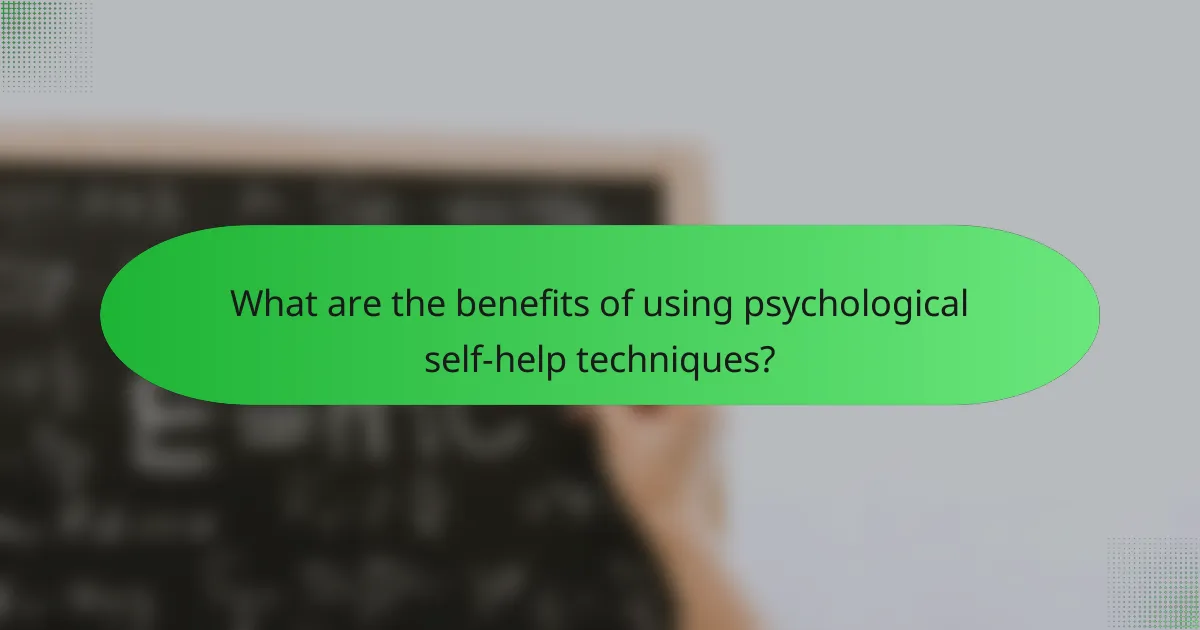
What are the benefits of using psychological self-help techniques?
Psychological self-help techniques offer numerous benefits, including improved mental health, enhanced coping skills, and increased self-awareness. These techniques empower individuals to manage stress, anxiety, and depression effectively. They also foster resilience and promote personal growth. For example, practices like mindfulness and cognitive restructuring can lead to significant improvements in emotional well-being. Engaging in self-help strategies encourages proactive behavior, allowing individuals to take charge of their mental health journey.
How do self-help techniques improve mental health and well-being?
Self-help techniques significantly enhance mental health and well-being by promoting self-awareness, resilience, and coping strategies. These techniques empower individuals to take control of their mental state, leading to improved emotional regulation and reduced symptoms of anxiety and depression.
Practices such as mindfulness, journaling, and cognitive restructuring can effectively increase positive thinking patterns. Research indicates that regular engagement in these techniques correlates with higher life satisfaction and lower stress levels. For example, mindfulness meditation can reduce anxiety by 30%, fostering a sense of calm and clarity.
Moreover, self-help techniques often encourage social connections and community support, which are crucial for mental well-being. Engaging in group activities or support networks can enhance feelings of belonging and reduce isolation.
In summary, adopting self-help techniques can lead to transformative changes in mental health, equipping individuals with practical tools to navigate life’s challenges and improve overall well-being.
What impact do these techniques have on stress management?
Psychological self-help techniques significantly enhance stress management by promoting emotional regulation and fostering resilience. These techniques, such as mindfulness and cognitive restructuring, empower individuals to cope with stressors effectively. Research indicates that regular practice can reduce anxiety levels by up to 30%. Additionally, these methods encourage a proactive approach to mental health, leading to improved overall well-being.
How can self-help techniques foster personal growth and self-awareness?
Self-help techniques enhance personal growth and self-awareness by promoting introspection and actionable change. Techniques such as mindfulness, journaling, and cognitive restructuring enable individuals to identify thoughts and behaviors, leading to improved emotional regulation. As a result, practitioners often report increased clarity about personal values and goals. These methods foster resilience and adaptability, essential traits for navigating life’s challenges effectively.
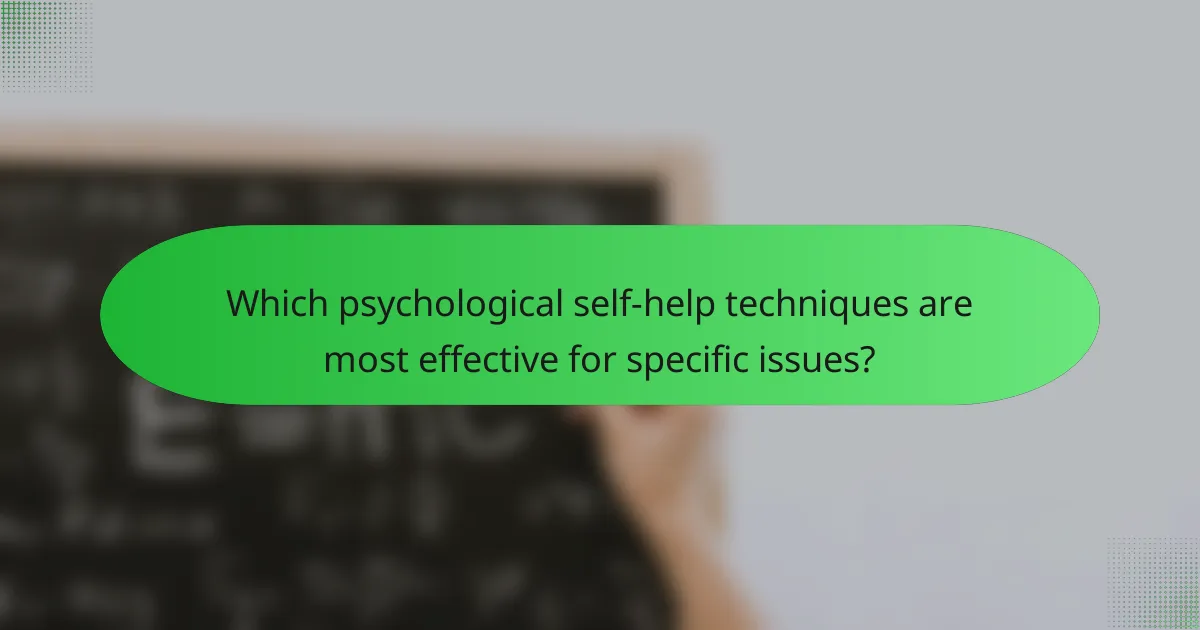
Which psychological self-help techniques are most effective for specific issues?
Cognitive Behavioral Therapy (CBT) techniques are effective for anxiety and depression. Mindfulness practices help with stress management. Journaling aids in self-reflection and emotional processing. Positive affirmations boost self-esteem and motivation. Visualization techniques enhance performance in various areas.
What techniques are recommended for anxiety management?
Cognitive-behavioral therapy, mindfulness meditation, deep breathing exercises, and progressive muscle relaxation are recommended techniques for anxiety management. These methods help individuals identify triggers, reduce stress, and promote relaxation. Cognitive-behavioral therapy focuses on changing negative thought patterns. Mindfulness meditation encourages present-moment awareness, reducing anxiety symptoms. Deep breathing exercises enhance oxygen flow, calming the nervous system. Progressive muscle relaxation systematically relaxes muscle groups, alleviating tension. Each technique offers unique benefits, making them effective for various anxiety levels.
Which self-help strategies are beneficial for depression?
Psychological self-help techniques beneficial for depression include cognitive behavioral strategies, mindfulness practices, and self-compassion exercises. These approaches enhance emotional regulation, reduce negative thinking, and foster resilience.
Cognitive behavioral techniques challenge distorted thoughts and promote healthier thinking patterns. Mindfulness practices, such as meditation, encourage present-moment awareness, reducing anxiety and stress. Self-compassion exercises cultivate kindness towards oneself, improving overall emotional well-being.
Research indicates that these strategies can lead to significant reductions in depressive symptoms, enhancing life satisfaction. Regular practice can empower individuals to manage their mental health effectively.
How do self-help techniques address relationship challenges?
Self-help techniques effectively address relationship challenges by enhancing communication, empathy, and conflict resolution skills. Techniques such as active listening and mindfulness promote understanding and reduce misunderstandings. These methods empower individuals to express feelings constructively, fostering healthier interactions. As a result, relationships can strengthen through improved emotional connections and trust.
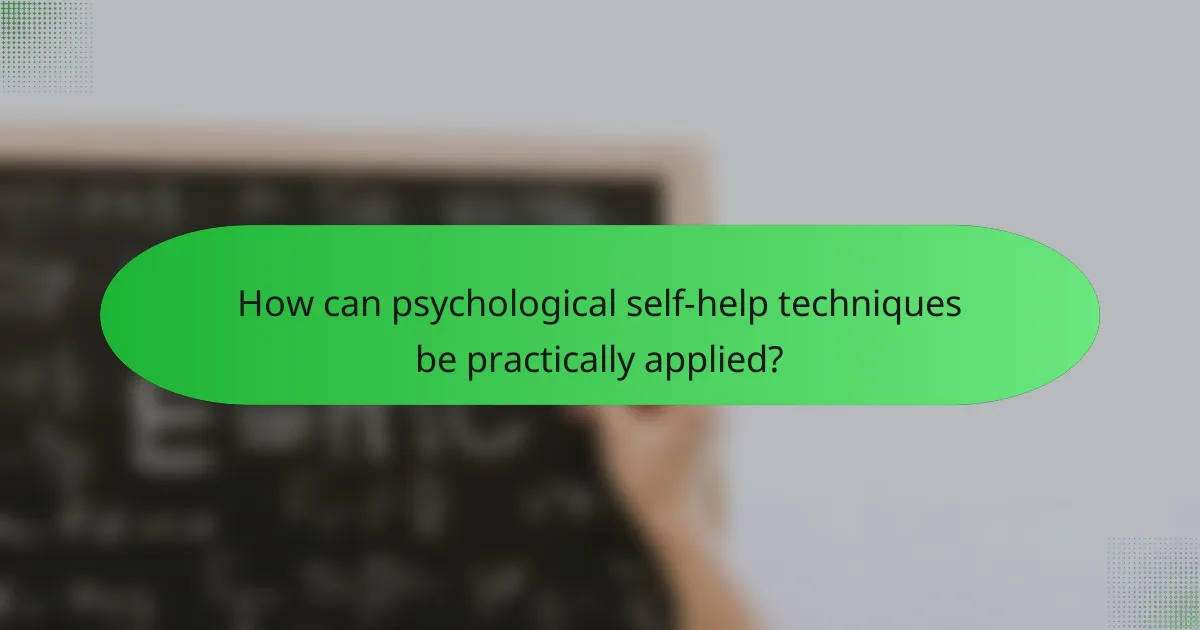
How can psychological self-help techniques be practically applied?
Psychological self-help techniques can be applied through practical exercises and strategies that enhance mental well-being. Techniques like mindfulness, journaling, and cognitive restructuring promote self-awareness and emotional regulation.
1. Mindfulness meditation: Practice focusing on the present moment to reduce stress and improve emotional resilience.
2. Journaling: Write about thoughts and feelings to gain insights and foster self-reflection.
3. Cognitive restructuring: Identify and challenge negative thought patterns to shift perspectives and improve mental health.
4. Goal setting: Define clear, achievable goals to enhance motivation and personal growth.
5. Breathing exercises: Use deep breathing techniques to manage anxiety and promote relaxation.
6. Positive affirmations: Reinforce self-worth and confidence through daily affirmations.
These techniques empower individuals to take charge of their mental health and foster resilience.
What steps should be followed to implement these techniques in daily life?
To implement psychological self-help techniques in daily life, follow these steps:
1. Identify specific techniques that resonate with your needs.
2. Set realistic goals for practicing these techniques regularly.
3. Create a structured daily routine incorporating the selected techniques.
4. Monitor your progress and adjust techniques as needed.
5. Reflect on your experiences and outcomes to reinforce learning.
How can technology support the use of self-help techniques?
Technology enhances self-help techniques by providing accessible tools and resources. Digital platforms offer guided meditation apps, online therapy sessions, and self-assessment quizzes. These resources empower users to track progress, receive feedback, and connect with communities. Additionally, wearable devices can monitor stress levels and promote mindfulness practices, making self-help more personalized and effective.
What role do support groups play in the application of self-help techniques?
Support groups enhance the effectiveness of self-help techniques by providing emotional support, accountability, and shared experiences. Members can exchange strategies that have worked for them, fostering a sense of community. This environment encourages individuals to implement and persist with self-help practices. Additionally, support groups often offer diverse perspectives, making techniques more relatable and adaptable to personal situations. This interaction can lead to improved mental well-being and resilience, reinforcing the application of self-help methods.
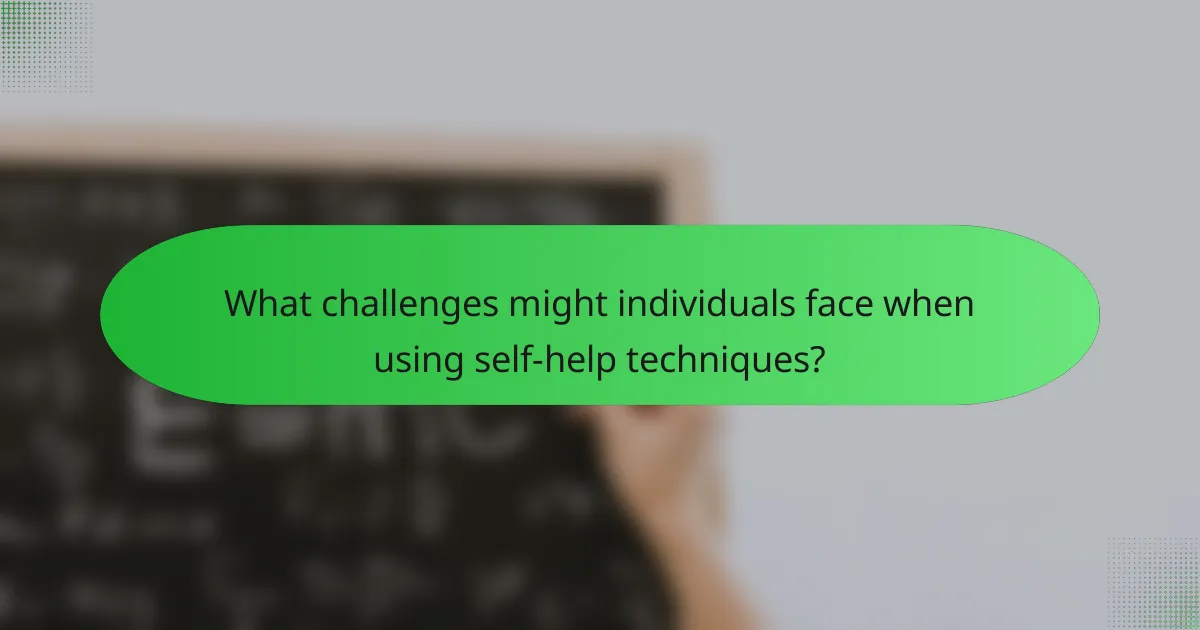
What challenges might individuals face when using self-help techniques?
Individuals using self-help techniques may face challenges such as lack of motivation, difficulty in self-discipline, and insufficient guidance. These obstacles can hinder progress and limit the effectiveness of the techniques. Additionally, individuals might struggle with unrealistic expectations, which can lead to frustration and disengagement. Emotional barriers, such as fear of change or self-doubt, can also impede the application of self-help strategies.
How can one overcome common barriers to effective self-help?
To overcome common barriers to effective self-help, one must identify and address personal challenges. Recognizing negative self-talk can help individuals replace it with positive affirmations. Setting realistic goals enhances motivation and provides a clear path forward. Engaging in consistent practices, such as journaling or mindfulness, fosters resilience and self-awareness. Seeking support from friends or professionals can also break isolation and encourage accountability.
What misconceptions about self-help techniques should be addressed?
Many misconceptions about psychological self-help techniques can hinder their effectiveness. Common myths include the belief that self-help is a quick fix, that it only works for specific problems, and that it replaces professional therapy. These misconceptions can lead to unrealistic expectations and discourage individuals from fully engaging with the techniques. Addressing these myths is crucial for promoting a realistic understanding of self-help’s role in personal development and mental well-being.
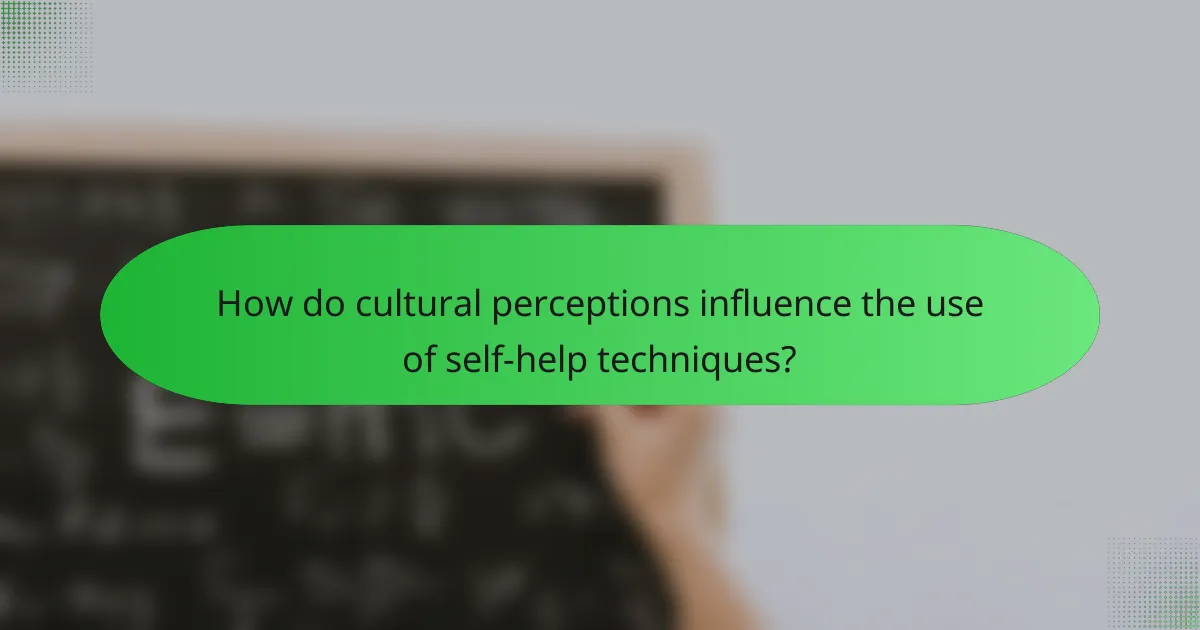
How do cultural perceptions influence the use of self-help techniques?
Cultural perceptions significantly shape the adoption and effectiveness of psychological self-help techniques. Different cultures have varying beliefs about mental health, which influences how individuals perceive self-help practices. For instance, in collectivist societies, community support may enhance the acceptance of self-help methods, while individualistic cultures might emphasize personal responsibility.
Additionally, cultural stigma surrounding mental health can either hinder or promote the use of self-help techniques. In cultures where discussing mental health is taboo, individuals may avoid these techniques despite their potential benefits. Conversely, cultures that encourage open dialogue about emotional well-being may see higher engagement in self-help strategies.
Moreover, the types of self-help techniques favored can vary. Some cultures may prefer traditional practices, such as meditation or family counseling, while others might lean towards modern approaches like cognitive-behavioral techniques. This diversity highlights the unique attributes of cultural contexts that influence the application of self-help methods.
Ultimately, understanding these cultural nuances is crucial for effectively promoting psychological self-help techniques across different populations.
What variations exist in self-help practices across different cultures?
Self-help practices vary significantly across cultures, reflecting diverse beliefs and values. For instance, Western cultures often emphasize cognitive-behavioral techniques, focusing on individual thought patterns. In contrast, Eastern cultures may prioritize mindfulness and meditation, promoting holistic well-being. Indigenous practices frequently incorporate community support and spiritual elements, highlighting the collective over the individual. Each approach offers unique benefits, tailored to cultural contexts and needs.
How can cultural sensitivity enhance the effectiveness of self-help techniques?
Cultural sensitivity enhances the effectiveness of self-help techniques by tailoring approaches to diverse backgrounds. Understanding cultural differences allows practitioners to create relevant, relatable content that resonates with individuals. This alignment fosters trust and engagement, increasing the likelihood of successful outcomes. Additionally, culturally sensitive techniques can address unique challenges and values, promoting deeper personal growth.
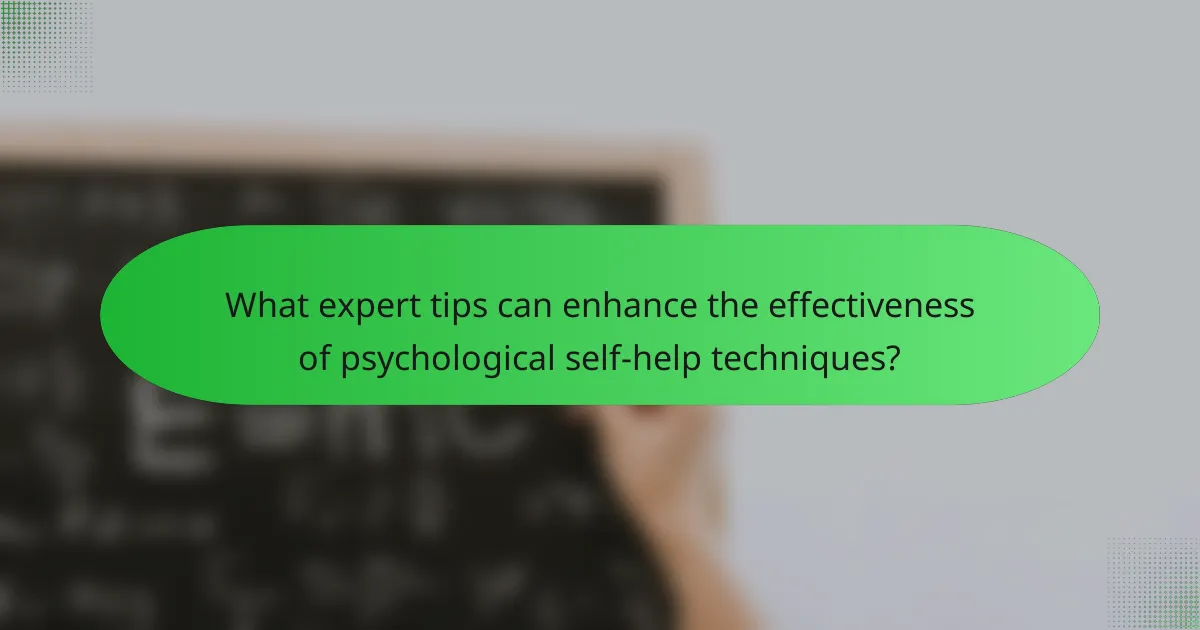
What expert tips can enhance the effectiveness of psychological self-help techniques?
To enhance the effectiveness of psychological self-help techniques, incorporate a structured approach, consistency, and mindfulness.
1. Establish clear goals to provide direction and motivation.
2. Practice regularly to reinforce techniques and build habits.
3. Use mindfulness to increase self-awareness and emotional regulation.
4. Seek feedback from trusted sources to gain new perspectives.
5. Adjust techniques based on personal experiences and outcomes.
6. Combine techniques with professional guidance when necessary for deeper insights.
What are the most common mistakes to avoid when practicing self-help?
Common mistakes in self-help include overgeneralization, neglecting individual needs, and setting unrealistic goals. Many individuals fail to personalize techniques, leading to ineffective outcomes. Additionally, skipping consistent practice diminishes progress. A lack of patience can also hinder results, as self-help often requires time for meaningful change.
How can individuals track their progress with self-help techniques?
Individuals can track their progress with self-help techniques by setting specific goals, maintaining a journal, and using self-assessment tools. Regularly reviewing these elements helps identify patterns and areas for improvement.
1. Set specific, measurable goals to monitor achievements.
2. Maintain a journal to document thoughts, feelings, and progress.
3. Use self-assessment tools to evaluate emotional and psychological changes.
4. Review progress regularly to adjust techniques as needed.
What resources are recommended for further exploration of self-help techniques?
For exploring self-help techniques, recommended resources include books, online courses, podcasts, and reputable websites. Notable titles like “The Power of Now” by Eckhart Tolle and “Atomic Habits” by James Clear provide practical insights. Online platforms such as Coursera and Udemy offer structured courses on various self-help methods. Podcasts like “The Happiness Lab” and “Therapy Chat” discuss psychological strategies and personal growth. Websites like Psychology Today feature articles and tools for self-improvement.

